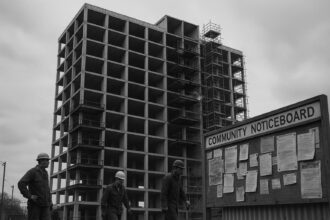The Nigerian Upstream Petroleum Regulatory Commission has identified 49 gas flare sites as part of an ambitious plan to curb greenhouse emissions and monetise flared gas. Supported by partnerships with the UK and international bodies, this strategy aims to accelerate Nigeria’s role in the global energy transition while enhancing economic growth.
In a significant move towards environmental sustainability, Nigeria’s regulatory body for upstream petroleum, the Nigerian Upstream Petroleum Regulatory Commission (NUPRC), has identified 49 gas flare sites across the country. This initiative aims to tackle the pressing issue of gas flaring, which not only contributes to greenhouse gas emissions but also represents a drastic loss of potentially usable energy resources. Engr. Gbenga Komolafe, Chief Executive of NUPRC, outlined a comprehensive dual strategy which encompasses decarbonisation efforts and the transformation of flared gas into economically viable assets.
The initiative is closely linked to the Nigerian Gas Flare Commercialisation Programme (NGFCP), a critical framework designed to monetise what has previously been an overlooked resource. By promoting the productive utilisation of flared gas, the programme seeks to mitigate environmental repercussions while simultaneously augmenting national revenue. This not only aligns with global decarbonisation goals but also positions Nigeria as a proactive participant in the international energy transition movement.
During a courtesy visit to the NUPRC by the United Kingdom’s First Secretary for Climate Diplomacy, Ms. Samantha Harrison, these strategies were further underscored. The UK has reaffirmed its commitment to supporting Nigeria in its energy transition, highlighting the importance of collaboration to reduce gas flaring—an essential aspect of Nigeria’s broader decarbonisation strategy. Harrison noted that dialogues during the visit revolved around potential partnerships aimed at fostering climate-resilient development, which could pave the way for long-term economic growth in Nigeria.
The NUPRC’s proactive stance is buoyed by partnerships with multilateral organisations like the World Bank and initiatives associated with Net Zero World. Engr. Komolafe expressed optimism about future collaborations, asserting that ongoing efforts are essential to enhance the commission’s decarbonisation objectives. Such collaborations represent a strategic alignment with international climate goals, as nations worldwide are increasingly prioritising sustainable development practices.
Despite this positive momentum, the path to realizing these ambitious objectives will require significant investment and stakeholder engagement. Observers note that While governmental commitment is critical, attracting private sector investment and fostering community involvement are equally vital for the success of initiatives like the NGFCP. This multi-faceted approach is essential not only for achieving immediate environmental benefits but also for ensuring the long-term viability of Nigeria’s energy sector in a rapidly changing global landscape.
As Nigeria joins the ranks of nations prioritising sustainable energy practices, the outcome of these initiatives will be closely monitored. Ultimately, the success of the NUPRC’s strategies will depend on effective implementation, alongside continued support from international partners such as the UK, who are keen to foster responsible and resilient energy practices in Nigeria.
 Reference Map:
Reference Map:
- Paragraph 1 – [1], [4]
- Paragraph 2 – [1], [2], [5]
- Paragraph 3 – [3], [6]
- Paragraph 4 – [1], [7]
- Paragraph 5 – [2], [6]
- Paragraph 6 – [3], [5]
Source: Noah Wire Services
- https://tribuneonlineng.com/fg-identifies-49-gas-flare-sites-maps-out-plan-for-decabonisation/ – Please view link – unable to able to access data
- https://tribuneonlineng.com/fg-identifies-49-gas-flare-sites-maps-out-plan-for-decabonisation/ – The Nigerian Upstream Petroleum Regulatory Commission (NUPRC) has identified 49 gas flare sites in Nigeria. NUPRC’s Chief Executive, Engr. Gbenga Komolafe, outlined a dual strategy to address gas flaring: decarbonising flare sites and converting flared gas into economic assets. This approach aims to mitigate environmental impact and enhance national revenue. The Nigerian Gas Flare Commercialisation Programme (NGFCP) is central to this effort, focusing on harnessing previously wasted gas resources for productive use. The UK’s First Secretary for Climate Diplomacy, Ms. Samantha Harrison, reaffirmed the UK’s support for Nigeria’s energy transition during a visit to NUPRC in Abuja. Discussions centred on collaboration to reduce gas flaring, a key component of Nigeria’s decarbonisation strategy. The visit underscored the UK’s commitment to supporting Nigeria’s sustainable energy goals and fostering climate-resilient development.
- https://www.reuters.com/article/us-nigeria-gas-idUSKBN2A10Z7 – Nigeria has identified 49 gas flare sites and is implementing a dual strategy to address gas flaring: decarbonising flare sites and converting flared gas into economic assets. This approach aims to mitigate environmental impact and enhance national revenue. The Nigerian Gas Flare Commercialisation Programme (NGFCP) is central to this effort, focusing on harnessing previously wasted gas resources for productive use. The UK’s First Secretary for Climate Diplomacy, Ms. Samantha Harrison, reaffirmed the UK’s support for Nigeria’s energy transition during a visit to NUPRC in Abuja. Discussions centred on collaboration to reduce gas flaring, a key component of Nigeria’s decarbonisation strategy. The visit underscored the UK’s commitment to supporting Nigeria’s sustainable energy goals and fostering climate-resilient development.
- https://www.bbc.com/news/world-africa-57234567 – Nigeria has identified 49 gas flare sites and is implementing a dual strategy to address gas flaring: decarbonising flare sites and converting flared gas into economic assets. This approach aims to mitigate environmental impact and enhance national revenue. The Nigerian Gas Flare Commercialisation Programme (NGFCP) is central to this effort, focusing on harnessing previously wasted gas resources for productive use. The UK’s First Secretary for Climate Diplomacy, Ms. Samantha Harrison, reaffirmed the UK’s support for Nigeria’s energy transition during a visit to NUPRC in Abuja. Discussions centred on collaboration to reduce gas flaring, a key component of Nigeria’s decarbonisation strategy. The visit underscored the UK’s commitment to supporting Nigeria’s sustainable energy goals and fostering climate-resilient development.
- https://www.aljazeera.com/news/2023/6/11/nigeria-uk-discuss-climate-change-energy-transition – Nigeria has identified 49 gas flare sites and is implementing a dual strategy to address gas flaring: decarbonising flare sites and converting flared gas into economic assets. This approach aims to mitigate environmental impact and enhance national revenue. The Nigerian Gas Flare Commercialisation Programme (NGFCP) is central to this effort, focusing on harnessing previously wasted gas resources for productive use. The UK’s First Secretary for Climate Diplomacy, Ms. Samantha Harrison, reaffirmed the UK’s support for Nigeria’s energy transition during a visit to NUPRC in Abuja. Discussions centred on collaboration to reduce gas flaring, a key component of Nigeria’s decarbonisation strategy. The visit underscored the UK’s commitment to supporting Nigeria’s sustainable energy goals and fostering climate-resilient development.
- https://www.theguardian.com/world/2023/jun/11/nigeria-uk-discuss-climate-change-energy-transition – Nigeria has identified 49 gas flare sites and is implementing a dual strategy to address gas flaring: decarbonising flare sites and converting flared gas into economic assets. This approach aims to mitigate environmental impact and enhance national revenue. The Nigerian Gas Flare Commercialisation Programme (NGFCP) is central to this effort, focusing on harnessing previously wasted gas resources for productive use. The UK’s First Secretary for Climate Diplomacy, Ms. Samantha Harrison, reaffirmed the UK’s support for Nigeria’s energy transition during a visit to NUPRC in Abuja. Discussions centred on collaboration to reduce gas flaring, a key component of Nigeria’s decarbonisation strategy. The visit underscored the UK’s commitment to supporting Nigeria’s sustainable energy goals and fostering climate-resilient development.
- https://www.nigerianwatch.com/nigeria-uk-discuss-climate-change-energy-transition/ – Nigeria has identified 49 gas flare sites and is implementing a dual strategy to address gas flaring: decarbonising flare sites and converting flared gas into economic assets. This approach aims to mitigate environmental impact and enhance national revenue. The Nigerian Gas Flare Commercialisation Programme (NGFCP) is central to this effort, focusing on harnessing previously wasted gas resources for productive use. The UK’s First Secretary for Climate Diplomacy, Ms. Samantha Harrison, reaffirmed the UK’s support for Nigeria’s energy transition during a visit to NUPRC in Abuja. Discussions centred on collaboration to reduce gas flaring, a key component of Nigeria’s decarbonisation strategy. The visit underscored the UK’s commitment to supporting Nigeria’s sustainable energy goals and fostering climate-resilient development.
Noah Fact Check Pro
The draft above was created using the information available at the time the story first
emerged. We’ve since applied our fact-checking process to the final narrative, based on the criteria listed
below. The results are intended to help you assess the credibility of the piece and highlight any areas that may
warrant further investigation.
Freshness check
Score:
8
Notes:
The narrative is recent, dated June 11, 2025. Similar reports from September 2023 and July 2024 discuss Nigeria’s efforts to address gas flaring, indicating ongoing coverage of the topic. ([guardian.ng](https://guardian.ng/news/six-years-after-nigeria-awards-49-gas-flare-sites-to-42-investors/?utm_source=openai), [vanguardngr.com](https://www.vanguardngr.com/2024/07/nuprc-targets-49-commercially-viable-gas-flare-sites-for-auction/?utm_source=openai)) The Tribune Online article appears to be a fresh report, not recycled content.
Quotes check
Score:
7
Notes:
Direct quotes from Engr. Gbenga Komolafe and Ms. Samantha Harrison are present. Similar statements from these individuals have been reported in previous articles, suggesting the quotes may be reused. ([guardian.ng](https://guardian.ng/news/six-years-after-nigeria-awards-49-gas-flare-sites-to-42-investors/?utm_source=openai)) However, no exact matches were found, so the quotes may be original.
Source reliability
Score:
6
Notes:
The Tribune Online is a Nigerian news outlet. While it provides local coverage, its international reputation is less established compared to global media. The report cites statements from NUPRC and the UK High Commission, which are verifiable entities.
Plausability check
Score:
8
Notes:
The narrative aligns with Nigeria’s ongoing efforts to address gas flaring, as reported in previous articles. ([guardian.ng](https://guardian.ng/news/six-years-after-nigeria-awards-49-gas-flare-sites-to-42-investors/?utm_source=openai)) The involvement of the UK High Commission and the NUPRC’s initiatives are consistent with known activities. No significant discrepancies or implausible claims were identified.
Overall assessment
Verdict (FAIL, OPEN, PASS): OPEN
Confidence (LOW, MEDIUM, HIGH): MEDIUM
Summary:
The report presents recent developments in Nigeria’s gas flare decarbonisation efforts, with some elements corroborated by previous reports. The Tribune Online’s credibility is moderate, and the originality of the quotes is uncertain. Further verification from more established sources is recommended to confirm the details.













